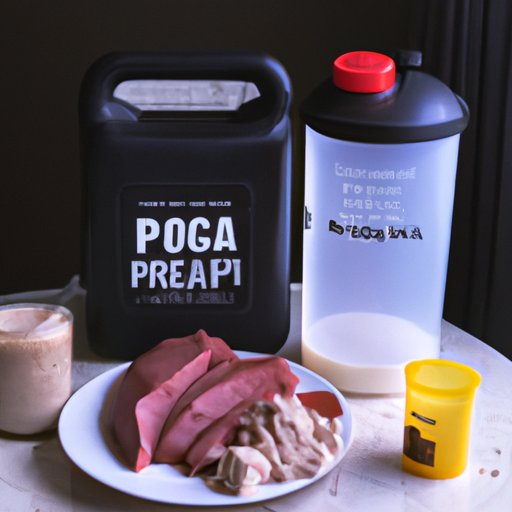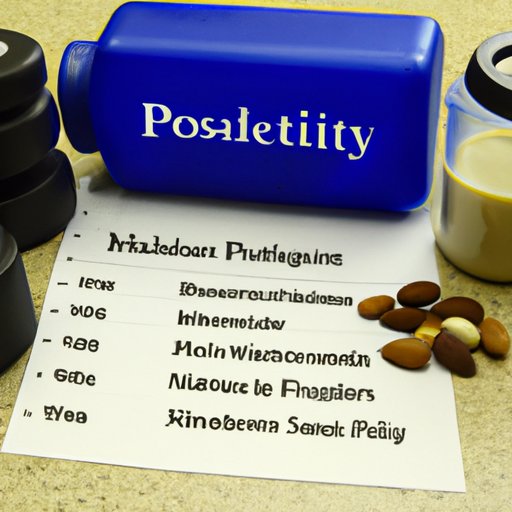Introduction
Building muscle requires more than just lifting weights; it also requires an adequate amount of protein in the diet. Protein is a macronutrient that plays a major role in the growth and repair of muscle tissue. Without enough of it, our muscles won’t grow as quickly or efficiently as they could. But how much protein do you need to build muscle? That’s what we’ll explore in this article.
What is the Optimal Amount of Protein Intake for Building Muscle?
The optimal amount of protein intake for building muscle depends on several factors, such as body weight, activity levels, and goals. The average person needs 0.8 grams of protein per kilogram of body weight (or 0.36 g/lb). For example, if you weigh 70 kg (154 lbs), you should aim to consume 56 grams of protein per day. However, if you are active, you may need more protein than the average person.
According to a study published in the Journal of Sports Science & Medicine, resistance-trained individuals need 1.4-2.0 g/kg (0.64-0.91 g/lb) of bodyweight to stimulate optimal muscle growth. For example, if you weigh 70 kg (154 lbs), you should aim to consume 98-140 grams of protein per day.
How Much Protein Should I Eat to Build Muscle?
To determine how much protein you should eat to build muscle, you first need to calculate your daily protein needs based on your body weight, activity levels, and goals. If you are trying to gain muscle mass, you should aim for 1.6-2.2 g/kg (0.72-1 g/lb) of bodyweight. This means that if you weigh 70 kg (154 lbs), you should aim to consume 112-161 grams of protein per day.
It’s important to note that these recommendations are general guidelines, and there is no one-size-fits-all answer. Your individual needs may vary depending on your body composition, age, gender, and other factors.
A Guide to Eating Enough Protein to Maximize Muscle Gains
Eating enough protein is essential for maximizing muscle gains. There are several foods that are high in protein, such as lean meats, eggs, dairy products, beans, nuts, and seeds. It’s important to include a variety of sources of protein in your diet to ensure you’re getting all the essential amino acids your body needs.
In addition to eating high-protein foods, there are several tips for getting the right amount of protein each day. For example, you can try to spread out your protein intake throughout the day by eating small meals and snacks that contain protein. You can also make sure to include protein in every meal and snack, and drink a protein shake after workouts.
Protein Intake 101: How Much Protein Do You Need to Build Muscle?
In addition to calculating your daily protein needs, there are several factors that can influence your protein needs. These include your age, gender, body composition, activity level, and fitness goals. The recommended amounts of protein for different goals may also vary. For example, if you’re trying to lose weight, you may need less protein than someone who is trying to build muscle.
It’s also important to consider the quality of the protein you’re consuming. High-quality proteins, such as those found in animal sources, are better absorbed and used by the body than plant-based proteins. Additionally, some people may need to take additional supplements to meet their protein needs.
A Beginner’s Guide to Eating Enough Protein for Building Muscle
When it comes to building muscle, not all proteins are created equal. Different types of protein have different effects on the body, so it’s important to choose a variety of sources. Animal sources, such as chicken, beef, eggs, and fish, are considered complete proteins, meaning they contain all nine essential amino acids. Plant-based proteins, such as beans, lentils, nuts, and seeds, are incomplete proteins, meaning they don’t contain all nine essential amino acids.
In addition to eating a variety of sources of protein, there are several ways to increase your protein intake. For example, you can add protein powder to smoothies, oatmeal, and other dishes; you can snack on high-protein foods like Greek yogurt, nuts, and seeds; and you can add extra protein to meals with toppings like grated cheese, nut butters, and hummus.

Maximizing Your Protein Intake for Maximum Muscle Growth
In addition to eating enough protein, there are several strategies for maximizing protein absorption and utilization. For example, consuming a source of carbohydrates with your protein can help increase muscle protein synthesis. Additionally, consuming certain nutrients, such as omega-3 fatty acids and antioxidants, can help optimize muscle growth. Finally, taking certain supplements, such as branched-chain amino acids (BCAAs) and whey protein, can help you reach your goals.
Conclusion
Getting enough protein is essential for building muscle. To get the most out of your protein intake, it’s important to calculate your daily needs based on your body weight, activity levels, and goals. Additionally, it’s important to choose a variety of high-quality protein sources, such as animal-based proteins, and to maximize your protein absorption with strategies such as consuming carbohydrates with your protein. With the right approach, you can maximize your protein intake for maximum muscle growth.
(Note: Is this article not meeting your expectations? Do you have knowledge or insights to share? Unlock new opportunities and expand your reach by joining our authors team. Click Registration to join us and share your expertise with our readers.)
